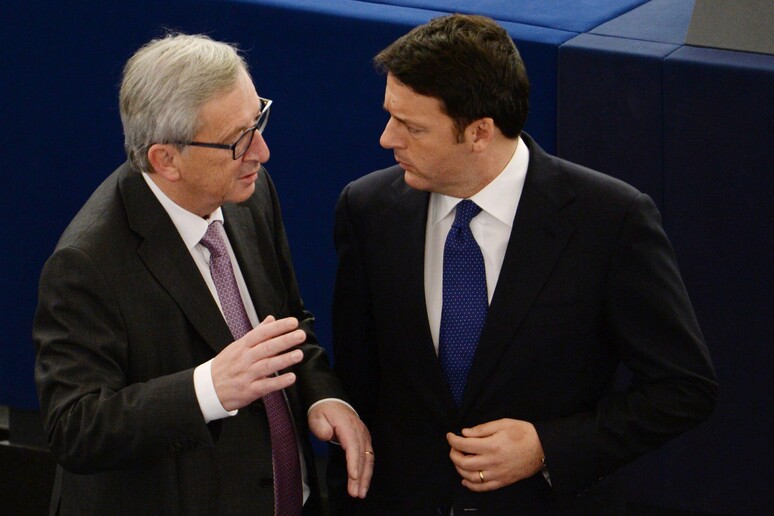Taking their cue from an
unusually sharp exchange between Italian Premier Matteo Renzi
and European Commission President Jean-Claude Juncker Friday, EU
sources told ANSA anonymously Monday that Brussels has been
having a communication problem with Rome.
The sources said the EU didn't really know who their
speaking partner was, prompting Foreign Minister Paolo Gentiloni
to respond that "the interlocutor is the Italian government, in
the fullness of its powers."
And Germany's ambassador to Italy said that Berlin, often
seen as the leader of the EU, needed Italy, adding that next
week's meeting in Berlin between Renzi and German Chancellor
Angela Merkel would clear up problems.
Speaking on condition of anonymity, the European sources
told ANSA there is concern at the highest EU levels over a lack
of communication channels with Rome.
Communication issues can turn into political problems, the
sources said.
European Commission President Juncker was and is Premier
Renzi's friend and Italy's best ally, the sources said. Juncker
and Renzi traded barbs Friday over economic flexibility clauses
and migrants - and Renzi said Italy had made major structural
reforms and was no longer being "remotely controlled" by
Brussels.
Juncker had lost his patience, the EU sources said.
They went on to describe Italy's representative in
Brussels, Stefano Sannino, as the best ambassador in the Belgian
capital.
What's missing, however, is continuous dialogue with
experts and envoys on specific issues, such as the ones other
European governments send in between major summits. This working
method helps smooth rough edges long before leaders engage, the
sources said.
For example, France sent specialists to "negotiate for
weeks" on its behalf over its national budget last fall.
This communication gap has generated misunderstandings over
Italy's four rescued banks, its troubled ILVA steelmaker, and
the use of flexibility clauses among other issues, according to
the sources.
They went on to list two areas of EU concern over Italy:
its protests after losing its only component on Juncker's
cabinet, legal expert Carlo Zadra, earlier this month - Zadra
quit and was replaced by a Briton after clashing with
Cabinet Chief Martin Selmayr - and its blocking of a
three-billion-euro fund for Syrian refugees in Turkey in spite
of the fact that the Commission has "put it in writing" that the
aid won't be included in deficit calculations.
In response, Gentiloni said that "we have a continuous
dialogue with the institutions, we have a foreign minister,
interior, economy, Italy has a government in the fullness of its
powers".
"I have continuous dialogue with the institutions on
problems, I think we have a government, a premier, a foreign
minister, and interior minister, an economy minister, depending
on the issues Italy has a government in the fullness of its
powers," Gentiloni said.
"We have to stick to the issues, go into the merits," he
concluded.
Italy "doesn't take part in pointless arguments", Gentiloni
said earlier, on his way in to a council of EU foreign ministers
Monday.
"I consider some of the remarks that came from Brussels to
be useless," Gentiloni said.
"The situation in Europe is very delicate right now, both
economically and on the migration front, and this delicate
situation should be faced without the argumentative tones I
heard coming from Brussels recently and which are, I repeat,
pointless," the minister said.
Also in response to the 'lack of interlocutor' charge
Monday, EU foreign affairs chief Federica Mogherini said that
"the interests of Italy and the EU coincide" and "the channels
with the Italian government are there and have always been open,
and also the exchanges with the Italian government are there,
from what I see".
Mogherini stressed the importance of having common goals on
issues like flexibility and immigration, saying "in a year
instruments have been introduced that before were not there,
thanks to Italy and the Commission".
Meanwhile Undersecretary for EU affairs Sandro Gozi said
that "these (EU) statements are unusual, but we think they can
be resolved with politics and by addressing the issues that we
have put on the table, above all in the interests of that Europe
which must change".
He said "we have no personal problems with any of the
members of the (European) Commission".
Gozi said "if the anonymous sources wanted to
restart dialogue, we welcome that. But Italy has its sticking
points and has highlighted them, on what the EU must do to
change". He said "right from the start the Renzi government made
explicit what must be done in the EU" and therefore "we will
continue to be constructive when we see that the Commission
moves towards a new start, and we will continue to be critical
in a constructive way when we see that there are delays and
inertia".
Germany's ambassador to Italy weighed into the flap, saying
that "Germany needs Italy and recognises and appreciates its
efforts to improve Europe and modernise its own country".
Susanne Marianne Wasum-Rainer told Radio Radicale that
"Rome and Berlin have common interests and problems, we are
united and we have a great responsibility".
She said "we are in favour of debate, that should not be
taken forward in a polemical way, we need exchange".
Next week's meeting in Berlin between Renzi and Merkel "is
an important meeting between two close European partners,
between two heads of government who esteem each other,"
Wasum-Rainer went on.
"I am confident that the solutions for the problems that
have been posed will be found," she said.
ALL RIGHTS RESERVED © Copyright ANSA











